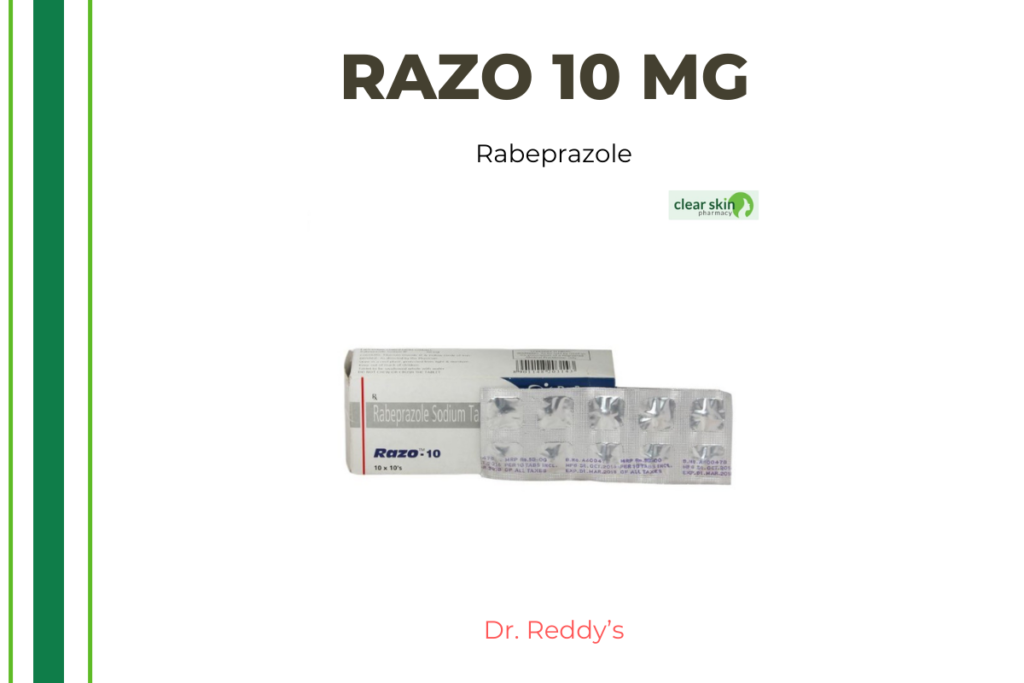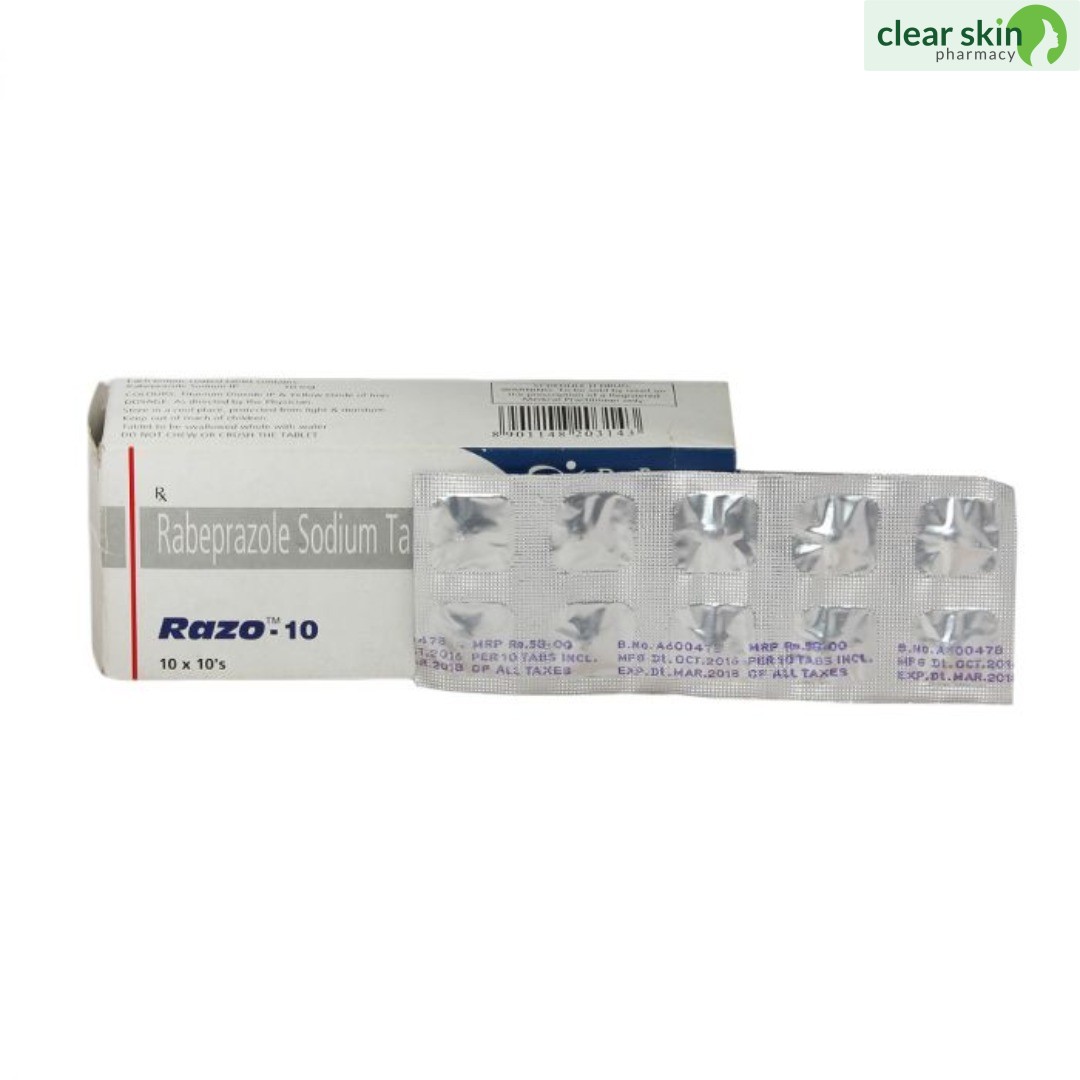Razo 10 mg
Razo 10 mg is a proton pump inhibitor, which is an antiulcer medication used to treat duodenal ulcers, gastro-oesophageal reflux disease, heartburn, erosive oesophagitis (acid-related damage to the lining of the oesophagus), Helicobacter pylori infections when given with an antibiotic, and Zollinger-Ellison syndrome.
Razo 10 mg works by inhibiting the acid-producing enzyme responsible for gastric proton pump activity. This aids in the reduction of acid production, ulcer healing, and ulcer prevention.
30 minutes before consuming, 10 mg of Razo should be taken. Razo 10 mg tablets should be swallowed whole with a full glass of water; it is not recommended to pulverize or crush the tablets. Razo 10 mg injections must be administered by a medical professional; do not self-administer. Depending on the severity of your medical condition, you should take Razo 10 mg for as long as your physician prescribes. Common side effects include headache, vertigo, diarrhea, constipation, nausea, vomiting, flatulence (wind), weakness, flu-like symptoms, back pain, pains, infection, trouble sleeping, cough, sore throat, and runny nose. The majority of these side effects do not require medical intervention and will subside over time. However, if you experience these side effects frequently, you should consult your physician.
Inform your doctor if you have a stomach tumor or hepatic condition before taking 10 mg of Razo. Long-term use of Razo 10 mg may decrease magnesium and vitamin B12 levels and increase the risk of bone fractures. If you are pregnant or breastfeeding, you should not consume 10 mg of Razo. Because Razo 10 mg can cause vertigo and fatigue, you should not operate a motor vehicle unless you are fully alert. Razo 10 mg should not be administered to children because the drug’s safety has not been established. Alcohol should be avoided while taking 10 mg of Razo, as it can cause drowsiness and increase gastric acid production. To rule out any adverse effects, keep your doctor informed of your current health status and medications.
Razo 10 mg is used to treat gastroesophageal reflux disease (GERD), duodenal ulcers, and Zollinger-Ellison syndrome.

Medicinal Advantages
Razo 10 mg is a proton pump inhibitor, a form of medication used to treat ulcers. Razo 10 mg is used to treat duodenal ulcers, gastro-oesophageal reflux disease (reflux of gastric contents into the oesophagus), heartburn, erosive oesophagitis (acid-related damage to the oesophageal lining), Helicobacter pylori infections when given with an antibiotic, and Zollinger-Ellison syndrome. Razo 10 mg works by inhibiting the acid-producing enzyme responsible for gastric proton pump activity. This aids in the reduction of acid production, ulcer healing, and ulcer prevention.
Utilize Directions
30 minutes before consuming, 10 mg of Razo should be taken. Razo 10 mg tablets should be swallowed whole with a full glass of water; it is not recommended to pulverize or crush the tablets. Razo 10 mg injections must be administered by a medical professional; do not self-administer. Your doctor will determine how long you should take Razo 10 mg based on your medical situation.
Place in a cold, dry area out of direct sunlight.
Razo 10 mg Side Effects
Headache
Dizziness
Diarrhea
Constipation
Nausea
Vomiting
Inflammatory bowel syndrome (wind)
Weakness
Back pain, aches, infection, difficulty sleeping, congestion, sore throat, and runny nose are among the most common flu-like symptoms.
Detailed Precautions and Warnings
If you are allergic to any of the ingredients in Rabeprazole, do not consume it. Inform your doctor if you have a stomach tumor, liver disease, or a scheduled Chromogranin A blood test before taking Rabeprazole. Long-term use of rabeprazole may result in low magnesium levels, vitamin B12 deficiency, and an increased risk of bone fractures; your physician may recommend monthly tests to monitor your condition. Rabeprazole is contraindicated during pregnancy and lactation. Rabeprazole can cause drowsiness and vertigo, so only operate a vehicle if you are entirely alert. Because the safety of rabeprazole has not been proved, it should not be administered to minors. Avoid consuming alcohol while taking Rabeprazole, as it can increase stomach acid production and induce drowsiness. Long-term use of Rabeprazole has been associated with an increased risk of Clostridium difficile-associated diarrhea, so see your doctor immediately if your diarrhea persists. To rule out any adverse effects, keep your doctor informed of your current health status and medications.
Interactions Among Medications
Rabeprazole may interact with analgesics (aspirin, naproxen), antidepressants (duloxetine, amitriptyline), blood thinners (clopidogrel), hypothyroidism drugs (levothyroxine), anti-HIV (atazanavir), anti-fungals (ketoconazole, itraconazole), anti-cancer drugs (methotrexate), vitamins (cyanocobalamin), and (such as diazepam or zolpidem).
Food-Drug Interactions: Avoid smoking and consuming alcohol. Alcohol consumption increases stomach acid secretion, resulting in acid reflux and heartburn.
Rabeprazole may interact with conditions such as Clostridium difficile-associated diarrhea, liver disease, bone fractures, and hypomagnesemia (low levels of magnesium).
Safety Recommendations
ALCOHOL
While taking Rabeprazole, alcoholic beverages should be avoided. Alcohol consumption increases stomach acid secretion, resulting in acid reflux and heartburn.
PREGNANCY
Avoid Rabeprazole if you are pregnant or attempting to become pregnant. Please consult with a physician. Before prescribing it to you, your physician will weigh the benefits and potential risks.
BREAST FEEDING
Avoid using Rabeprazole if you are lactating. If you have any concerns, please consult a physician.
DRIVING
Rabeprazole can make you dizzy and drowsy. If you are not attentive, you should not drive or operate heavy machinery.
LIVER
In patients with hepatic disease, it may be necessary to adjust the dosage. If you have any concerns about this or if you have a hepatic condition, please consult a physician.
KIDNEY
In patients with kidney disease, it may be necessary to adjust the dosage. Please consult a physician if you have any concerns about this or if you have kidney impairment.
No habits formed
Diet and Lifestyle Advice
More frequent smaller portions should be consumed.
Avoid tobacco use and alcohol consumption. Alcohol consumption increases stomach acid secretion, resulting in acid reflux and heartburn.
Regular exercise can assist in weight maintenance.
To prevent acid reflux, do not recline after consuming.
Because tight clothing can increase pressure on the abdomen, causing acid reflux, it should be avoided.
By engaging in yoga or meditation, it is possible to exercise relaxation techniques and avoid tension.
Avoid consuming high-fat foods, spicy foods, chocolates, citrus fruits, pineapple, tomato, onion, garlic, tea, and beverages.
Long periods of sitting may result in acidity. Take a 5-minute respite every hour to walk briskly or stretch.
Recommendations
Inform your doctor if you are scheduled for a Chromogranin A blood test before taking Rabeprazole.
Abnormal levels of blood and liver enzymes are potential adverse effects of rabeprazole. Inform the individual conducting the tests that you are taking Rabeprazole.
Additional Information: This item cannot be returned.
Priorities of Patients
A mucous layer normally protects the stomach from the acid. Excessive acid secretion can erode the mucous layer, leading to acidity, GERD, heartburn, peptic ulcer, and Zollinger Ellison syndrome, among other conditions. Gastroesophageal reflux disease (GERD) is a disorder in which gastric acid refluxes frequently into the esophagus (oesophagus). Backflow (acid reflux) irritates the food conduit, resulting in heartburn. A duodenal ulcer is an excruciating disorder that causes the development of sores or ulcers in the duodenum or stomach lining (first part of the small intestine, i.e., the duodenum). The Zollinger Ellison syndrome is a rare disorder in which a gastrin-secreting tumor in the pancreas produces an excessive quantity of acid, resulting in peptic ulcers.
FAQs
Rabeprazole works by inhibiting the gastric proton pump, the enzyme responsible for acid production in the stomach. This aids in the reduction of acid production, ulcer healing, and ulcer prevention.
Rabeprazole can make you feel dizzy and drowsy. Therefore, you should not drive or operate machinery if you are dizzy or drowsy.
Consult your doctor if you do not feel improved after 14 days of taking Rabeprazole. Rabeprazole should only be taken for extended periods if prescribed by a physician. Rabeprazole should be monitored regularly if it is administered for an extended period of time.
Rabeprazole should not be discontinued without first consulting a physician. Continue taking Rabeprazole for as long as prescribed to treat your condition effectively. If you experience any issues while taking Rabeprazole, do not hesitate to inform your doctor.
Rabeprazole has the potential to induce diarrhea as a side effect. If you have diarrhea, consume copious amounts of water and fiber-rich foods. Consult a physician if you observe blood in your faeces (tarry stools) or if you have excessive diarrhea. Long-term use of Rabeprazole has been associated with an increased risk of Clostridium difficile-associated diarrhea, so see your doctor immediately if your diarrhea persists.
As a potential adverse effect, rabeprazole may lead to dry mouth. Caffeine restriction, avoiding tobacco and mouthwashes containing alcohol, consuming copious amounts of water, and chewing sugar-free gum/candy may all stimulate saliva production and prevent mouth dryness.
Alcohol should be avoided or consumed in moderation while taking Rabeprazole, as it can induce vertigo. Alcohol consumption increases stomach acid secretion, resulting in acid reflux and heartburn.
Long-term use of rabeprazole may increase the risk of hip, spine, and wrist fractures. Inform your doctor if you have osteoporosis or are taking corticosteroids.







Be the first to review “RAZO 10 MG 10 Tablets”